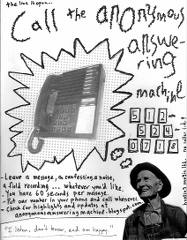Project 1: Anonymous Answering Machine
The inspiration for this project came from Sandy Stone's discussion of Thaddeus Cahill's 1897 teleharmonium.
 |
This device was an enormous analog synthesizer that played through the telephone lines to wealthy subscribers. It reminded me of radio - one signal going out to multiple receivers. |
I began thinking about a setup that would invert this flow - multiple signals going to one receiver - and then it hit me ... I could set up an answering machine, give out my number, and compile the messages.
The process of setting up the answering machine was a bit of a novelty for me. Most people of my generation do not have physical answering machines. In fact, most of us haven't ever even set up a landline. So, I had to do some independent research in order to find the most affordable landline.
"hey buddy it's me:" the first Anonymous Answering Machine Mix |
|---|
|
Google, in this instance, failed to turn up any desirable results. All of the companies wanted a long contract or a lot of start up fees. Most wanted to set me up with tons of features I didn't need, but then I came across a flyer for Grande Communications, a local phone and cable company, and they had a basic plan that seemed to fit my needs.
 |
|---|
| I emailed my father about sending an answering machine and he gladly sent one my way. I had to order a replacement battery supply, and when it arrived, I immediately set the machine up, recorded a greeting, and began publicizing. |
| I designed a flyer and distributed it around Austin (click here for the fullsize version), and I setup a blog so that I could begin documenting and presenting the project. I also invited a lot of friends of mine via Facebook to call in and contribute. |
 |
|---|
On the flyer, I asked that people remain anonymous and suggested that they "leave a message, a confession, a noise, a field recording ... whatever." The quote at the bottom of the flyer reads "I listen, don't know, and am happy," which is a line from the Portuguese poet Fernando Pessoa.
Every few days, I press play on the answering machine and listen to the messages. I record them with my mp3 player, upload them to my computer, edit them in Audacity, and then upload the mix to blogger with a description. Here's an example entry:
"david, it's your mother" |
in this installment we have a message for david from his mother (isn't this from a movie), some more feedback, a dialogue from someone's favorite movie, a prank call, a telemarketer, an awesome samba groove, a rather extended reading about religion. enjoy. oh and please keep calling and spread the word! |
|
|
I have also compiled some quotes that I think are relevant to my project and its implications:
Barthes, "The Grain of the Voice"
"This voice is not personal: it expresses nothing about the singer, about his soul; it is not original [...], and at the same time it is individual: it enables us to hear a body which, of course, has no public identity, no "personality," but which is nonetheless a separate body; and above all this voice directly conveys the symbolic, over and above the intelligible, the expressive: here, flung before us all in a heap, is the Father, his phallic status. That is what the 'grain' would be: the materiality of the body speaking its mother tongue" (270).
Barthes, "Listening"
How do recognize the first sound or say the first word? The telephone is always on. "Listening to the voice inaugurates the relation to the Other: the voice by which we recognize others (like writing on an envelope) indicates to us their way of being" (254-255).
The telephone collects individuals in an "ideal [...] subjectivity, because this instrument has abolished all senses except that of hearing" (251-252).
Connor, Sound and the Self
"The telephone offers a quasi-controlled collapse of boundaries, in which the listening self can be pervaded by the vocal body of another while yet remaining at a distance from it. The development of telephonic sex around a century later in the context of anxieties about actual physical interchange consequent upon AIDS, as represented, for example, in Nicholson Baker's novel Vox, testifies to a similar libidinization of the aural."
Marinetti, “Destruction of Syntax”
"Those who use the telephone today, the telegraph, the phonograph, the train, bicycle or automobile, the ocean liner, dirigible or airplane, the cinema or a great daily newspaper ... do not dream that these diverse forms of communication, transportation and information exert such a decisive influence upon their psyches."
McLuhan, Understanding Media
"Our private and corporate lives have become information processes because we have put our central nervous systems outside us in electric technology" (60).
"The principle of numbness comes into play with electric technology, as with any other" (56).
Taussig, Mimesis and Alterity
"The Surrealist insight regarding the power of ghosts embedded in the commodities created by yesteryear's technology" (232).
I think the project in part embodies a nostalgia for antiquated physical technology and for a slower pace of deterritorialization/communication (less movement, less perpetual wireless contact, etc.). My work on this project has helped me to stop worrying so much about my cell phone to the point that I am now contemplating switching over to a landline completely.
Furthermore, the Answering Machine allows for some of our more ephermeral voices and sounds to be performed and recorded. The accumulated anonymous utterances comprise a schizoid soundscape of confused humanity, irony, and pastiche
Please feel free to call in. And check the blog for regular updates and related links.